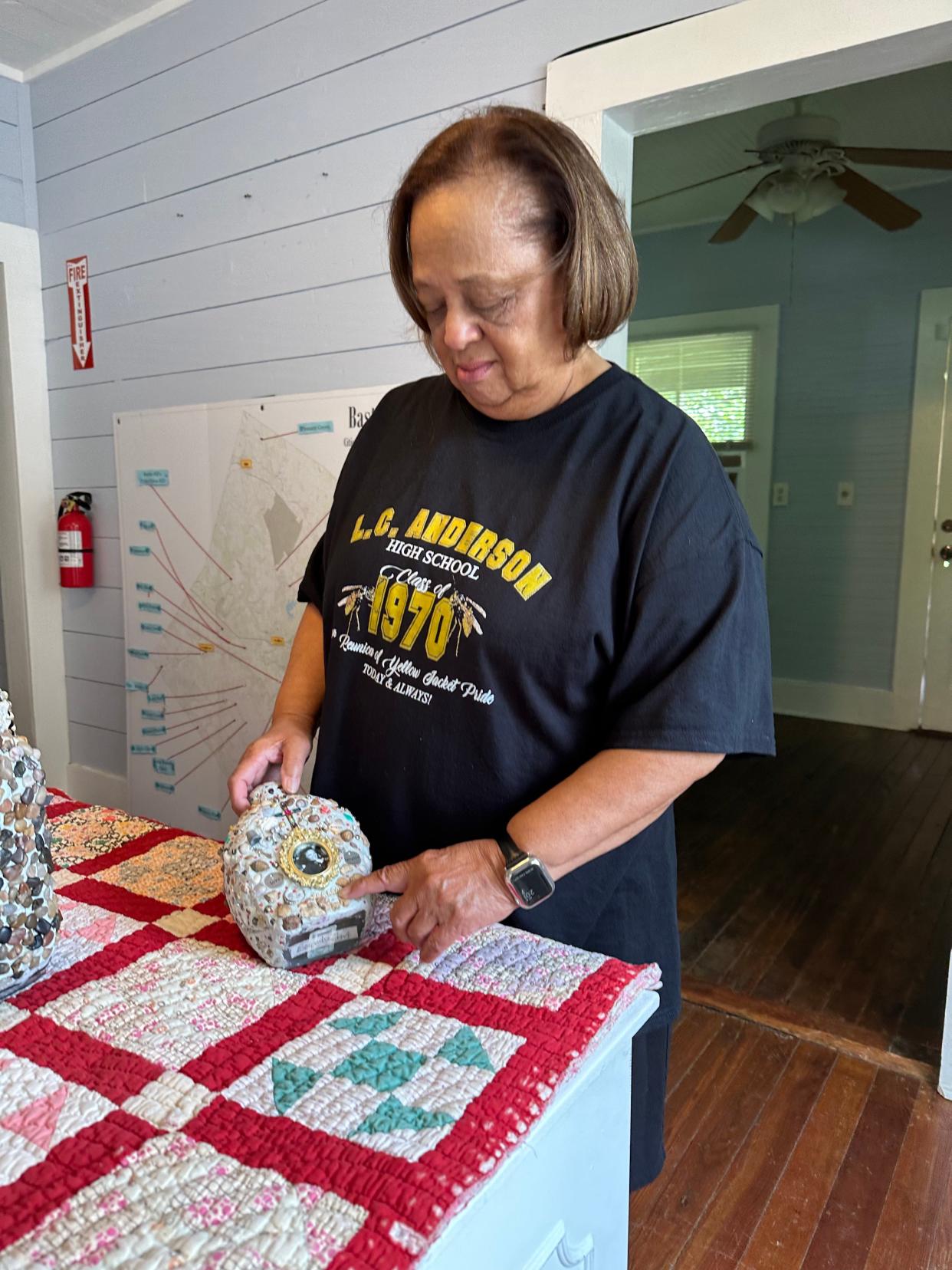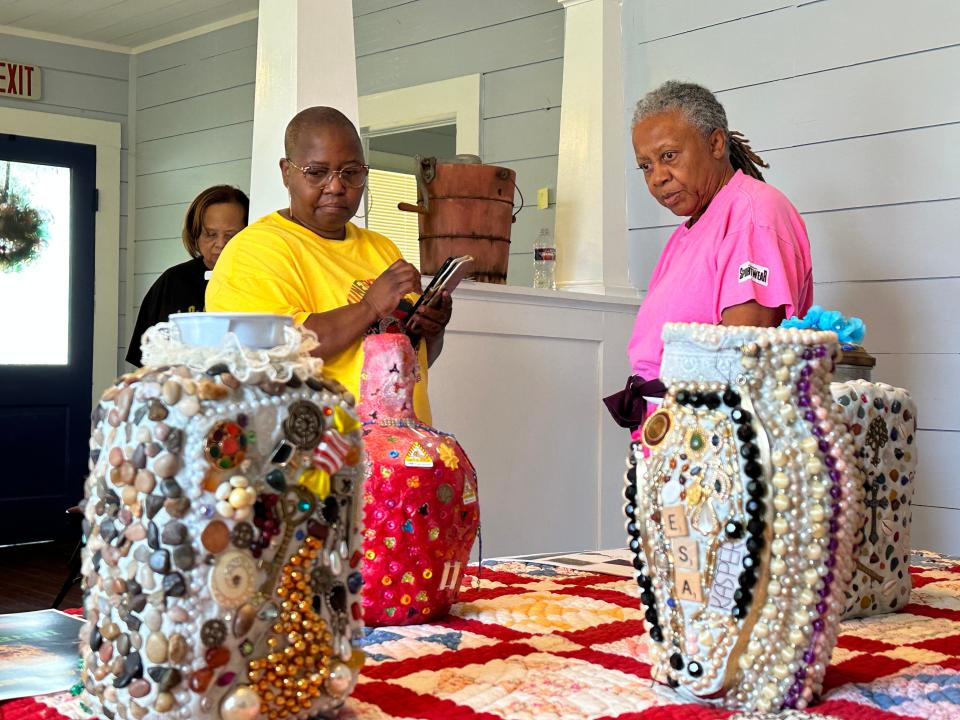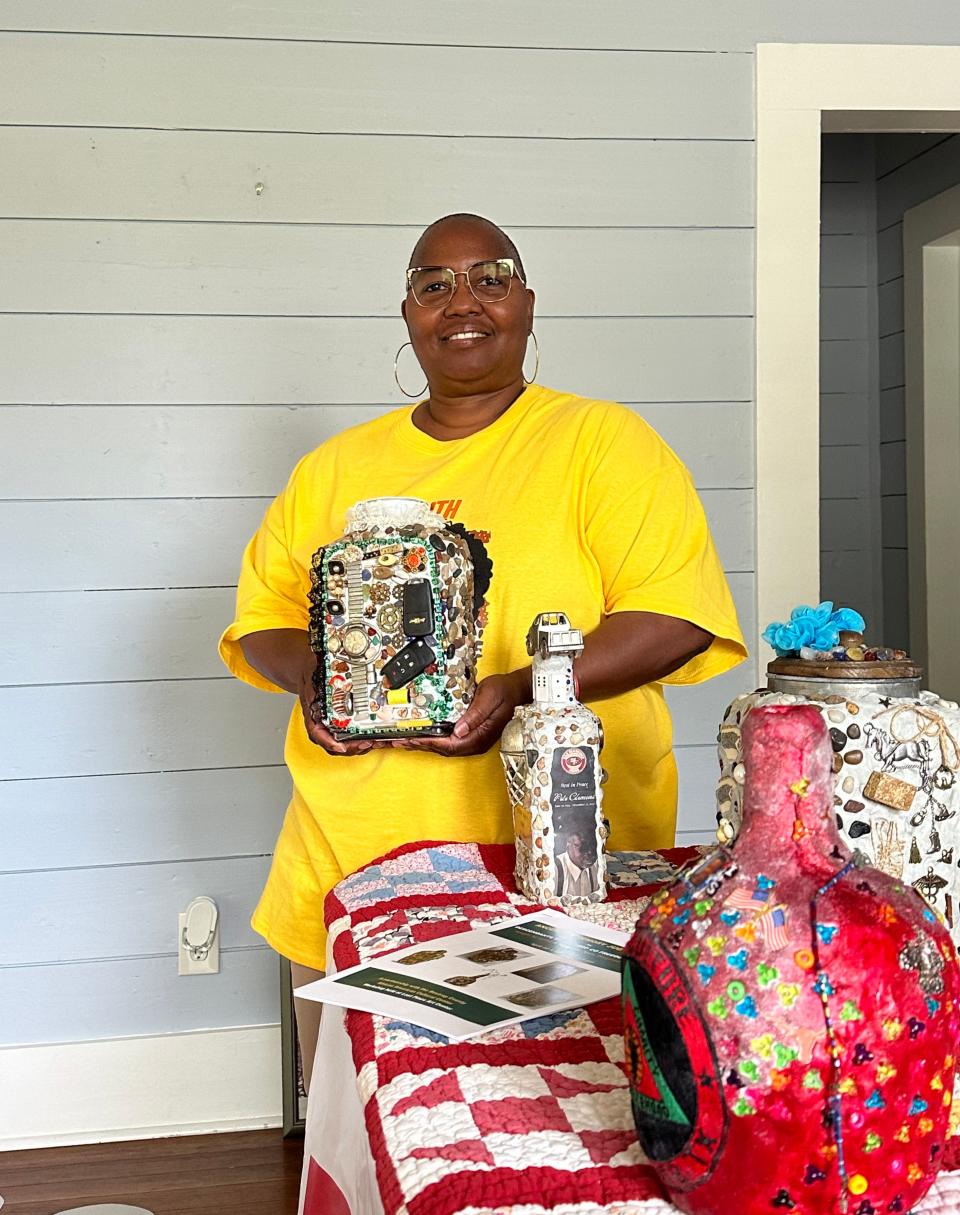Memory jugs on display in Bastrop hold bonds to past for African Americans

Belinda Davis gazed fondly at the small gold frame surrounded by trinkets and jewels on her memory jug as she spoke of her mother. Unconditional love, Davis said, was the definition of her mother, the woman who made countless sacrifices for her family.
As she recalled memories of her childhood, her eyes still on the black and white picture in the little frame, she said she felt proud to be able to pay her respects to the strongest person she knew through her memory jug.
Like Davis, descendants of Bastrop’s freedom colonies have captured parts of their passed loved ones in their own memory jugs, which originate from Africa to memorialize deceased family members. Residents brought in their own pots, jugs and other vessels and decorated them with small trinkets and materials that either belonged to or represented their passed loved ones.
The jugs, along with other artifacts telling the story of Bastrop’s African-American culture, will be showcased at the Bastrop County African American Cultural Center as a part of this year’s Juneteenth events. Celebrations will run from June 15 to June 18 at the cultural center, 1308 Walnut St., and the Freedom Colonies Museum at 1303 Pine Street.

More: With African American Cultural Center, the legacy of freedom colonies perseveres in Bastrop
The memory jug exhibition and project, which began this year, was pitched to the cultural center by Janis Bergman-Carton, an artist and retired art professor from Southern Methodist University. In her 25 years of teaching, Bergman-Carton focused her research on the cultural contributions of historically marginalized communities. After partnering with the Bastrop County cultural center and its co-founder, Doris Williams, Bergman-Carton hosted a couple of memory jug painting workshops in April, when residents decorated their own unique jugs that are now displayed in the Freedom Colonies Museum.
“What I became most interested in after retiring was the research around freedom colonies,” Bergman-Carton said. “I first saw one in Austin, where I now live. So I began looking around for small museums I could visit and found reference to this center and was lucky enough to find Doris when I called. And that’s how we began work in this museum.”
Freedom colonies, which were established between 1865 and 1930, were a safe haven for formerly enslaved people post-Emancipation. The colonies allowed the recently freed African-American people to gather together and build their own communities with spaces to worship, educate and simply exist without any impending threat on their lives. Today, about 557 freedom colonies have been found in Texas alone.

“We’re trying to preserve how our enslaved ancestors survived,” said Williams, who also is president of the cultural center. “We want that to be showcased in what was their home. We want to show how they survived, the tools that they used … and their contributions to the history of the United States.”
Williams, who started the nonprofit in 2019, said she was inspired to discover her heritage and ancestry by her grandmother.
“My sister and I were just kids then,” Williams said. “One day, my maternal grandmother called us over and said, “Baby, come here,” and when I did, she said, “When I die, I’d like to be buried in Hills Prairie in Bastrop County.” Now, I’m a young person so I didn’t understand why she’d want to be buried in Hills Prairie after building her whole life in Lubbock. Mind you, I didn’t even know where Hills Prairie was at the time.”
More: Bastrop voters to select between Jackson, Nelson in mayoral runoff election
After she got older, Williams said, she started doing more research and found that her grandmother’s mother and her ancestors were all enslaved in the Hills Prairie plantation house that still stands today. She said her grandmother considered that plantation house, where many generations above her lived and died, her true home.
Williams herself later moved from Lubbock and began to take part in her community, closer to where her ancestors once lived.

“I grew up in Lubbock,” Williams said. “But this has always felt like home. Hills Prairie and Bastrop County are my home.”
Like Williams, members of the Bastrop County African American Cultural Center have been researching Bastrop’s unique history with freedom colonies to preserve its history for youths and future residents. The Freedom Colonies Museum, where the memory jugs are exhibited, recently moved to the Wilson House that houses the museum from the Kerr Community Center to allow more access for people with disabilities, Williams said.
“We've always had a very strong presence in Bastrop as African Americans,” said former Bastrop City Council Member Dock Jackson. “At one time, there were probably equally as many African Americans in Bastrop, as there were others. … I've been in segregation, then desegregation and then integration. And I have stories I could tell. And now we have a lot more African Americans that are participating and trying to take part in our community, and they're proud of the heritage and they're sharing it.”
Jackson reiterated that the importance of the Freedom Colonies Museum and the cultural center was so the history and sacrifices from the African-American community in Bastrop would not be lost in the future,
“When I brought back Juneteenth to Bastrop years ago, people were kind of embarrassed to be talking about slavery,” Jackson said. “We don't want to talk about how a lot of the kids didn't know about separate-but-equal schools at all. I wanted to share the history so they know how far we've come. And it's not always been a cakewalk to live in a community that was segregated, but we were very fortunate in Bastrop that we were allowed to have our own separate community, and yet we could coexist with the majority community without having any issues.”
This year is only the second time that Juneteenth is being recognized federally. To find and showcase the history of their ancestors’ sacrifices, members of the cultural center have a mission to collect, archive and make their findings available to historians, educators and databases so that Bastrop’s rich culture does not get lost in history.
“My mama taught me how to dream big,” Davis said. “It sounds cliche, but I’ve grown up seeing so many kids with potential but low self-esteem. Not us, though. Because my mama always told me to follow whatever dreams we had, and we did. I miss her every day.”
This article originally appeared on Austin American-Statesman: Memory jugs hold bonds to past for African Americans

